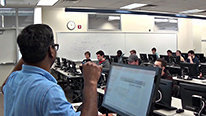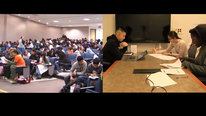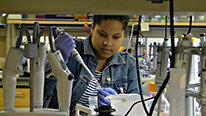- Paul Craig
- Professor
- Presenter’s NSFRESOURCECENTERS
- Rochester Institute of Technology
- Rebecca Roberts
- https://www.ursinus.edu/live/profiles/49-rebecca-roberts
- Associate Professor
- Presenter’s NSFRESOURCECENTERS
- Ursinus College
BASIL
NSF Awards: 1709170
2019 (see original presentation & discussion)
Grades 9-12, Undergraduate
The BASIL project is a combination of wet bench biochemistry experiments and bioinformatics exercises where students predict the function of a protein and then test their hypotheses. BASIL has been implemented in a wide variety of formats on some very different campuses. We are interested in assessing the extent to which students develop and demonstrate expert scientific behaviors in this Course-based Undergraduate Research Experience.
Science, Research / Evaluation, Instructional Materials
RIT, Ursinus College, Purdue Univ
Improving Undergraduate STEM Education (IUSE)
Related Content for On Becoming a Scientist
-
 2019Using Subgoal Labels to Improve Learning Outcomes in CS1
2019Using Subgoal Labels to Improve Learning Outcomes in CS1
Briana Morrison
-
 2020Passion-Driven Statistics: Data Analytics for Everyone
2020Passion-Driven Statistics: Data Analytics for Everyone
Lisa Dierker
-
 2021Strategies for facilitating and assessing transferable skill
2021Strategies for facilitating and assessing transferable skill
Renee Cole
-
 2021Taking Passion-Driven Statistics On-line
2021Taking Passion-Driven Statistics On-line
Lisa Dierker
-
 2018Learning Introductory Statistics with Interactive Songs
2018Learning Introductory Statistics with Interactive Songs
Dennis Pearl
-
 2019Project DIRACC
2019Project DIRACC
Fabio Milner
-
 2019Diversifying Access to Urban Universities for STEM Students
2019Diversifying Access to Urban Universities for STEM Students
Alison Slinskey Legg
-
 2018Tigriopus CURE: A Scalable Model for Laboratory Education
2018Tigriopus CURE: A Scalable Model for Laboratory Education
Jeffrey Olimpo
This video has had approximately 869 visits by 613 visitors from 217 unique locations. It has been played 286 times as of 05/2023.
Map reflects activity with this presentation from the 2019 STEM for All Video Showcase: Innovations in STEM Education website, as well as the STEM For All Multiplex website. 
Based on periodically updated Google Analytics data. This is intended to show usage trends but may not capture all activity from every visitor.
show more
Discussion from the 2019 STEM for All Video Showcase (21 posts)


Paul Craig
Professor
The BASIL project started in 2015 and there are now about 10 campuses that are actively engaged with the curriculum in undergraduate biochemistry labs. The student manual is available on the BASILbiochem site at GitHub. In addition to challenging our students to combine computational and wet lab methods, we also challenge them with a genuine research experience. In this process we believe that our students are changing and growing as scientists. We know that we are all changing and growing as their instructors. We are excited about the assessment we have already conducted on both groups (students and faculty) and plan to build on our past efforts. We are particularly interested in
Rebecca Roberts
Roxanne Hughes
Very cool! It is interesting that the students are driving their learning and development as scientists. In terms of Carlone and Johnson's (2007) work on recognition of identity. I wonder how students recognize each other as experts and how this is affected by or affects their interactions with scientists. For example, do all students equally feel qualified to contact scientists or just certain students?
Rebecca Roberts
Rebecca Roberts
Associate Professor
Roxanne - those are great ideas. We have had some students contact scientists but we have not yet assessed why they felt ready to do so while others have not. And thank you for the citation!
Ellis Bell
A great project. You ask about how faculty need to change the way they teach labs. In terms of student ownership of their work we are finding that less really is more. The more the lab approaches a research group setting rather than a teaching lab, the more the students take ownership
Rebecca Roberts
Associate Professor
Thank you Ellis. I'm interested in hearing how you would define the "ownership". I could see how that has many different components.
Jason Aloisio
Great Project!
Its great to see the model being implemented at multiple campuses. It is interesting that the faculty felt uncomfortable when they didn't know the answer. Did you provide some coaching or advice regarding this? If so what?
Paul Craig
Professor
We hold video chat sessions every week and this has been a frequent topic of discussion. All of the instructors knew from the start that none of us know the final answer on the function of these enzymes. In some cases we really don't know answers. In other cases, we can work our way through the data together (reading plasmid maps to identify the correct antibiotic or inducer for enzyme overexpression, for example) to figure out what is happening in the labs.
Rebecca Roberts
Associate Professor
We have the documents available for free at https://basilbiochem.github.io/basil/ and through that site instructors can request access to an Instructor Module that contains trouble-shooting tips, teaching strategies, etc., as well as assessment (with answers) that align with the Learning Objectives.
Lindsey Long
Bonnie Hall
Jay Labov's comment (below) about active learning connects to the instructor comfort component for me, as a BASIL participant new to the project this year. I use primarily active learning strategies in my teaching (to undergraduates), including guided inquiry. I have not experienced discomfort with BASIlL implementation, beyond the "normal" range I experience when teaching. But I can see how the active learning experience, where open-ended discussions mean I don't know what questions will be asked, has forced me to become comfortable with not having an answer for every question. I feel active learning has also helped my students be more comfortable with "not knowing", a benefit in a research environment.
Rebecca Roberts
Abigail Zoger
We are finisihing up an NSF CURE grant at Santa Rosa Junior College. There were a couple of comments in your video that jumped out at me:
the need for problem solving and iteration in science: I wonder if this is a key component of students beginning their path to becoming a scientist.
The discomfort with not knowing the answer: I see a differnt type of student succeeding in the CURE than in a more traditional lab. These are often not the A student who aces the exams. Instead it is the student who might be more creative and have better problem solving skills. And in the end, those are key to being a good scientist
Marilu Lopez Fretts
Lindsey Long
That is an interesting comment about the level of success observed in different "types" of students in CURE projects. Fall 2018 was my first time implementing BASIL. Anecdotally, I noticed more frustration by "A students" because they were not used to not knowing the correct answer. But I also noticed that this frustration forced more teamwork between students of varying academic success. This also forced the typically lower achieving students to critically think more often because their partner didn't always have the answer.
Rebecca Roberts
Jay Labov
Senior Advisor for Educaition and Communication (Retired
Thank you for producing and sharing this video. As facilitators we were asked to comment on each video we were assigned to "seed" discussion. For me, other things in life got in the way before I could so for this video. But I think that is actually fortunate in this case because of the great discussion that has already been posted here. A couple of thoughts that might then "seed" additional comments:
ON FRUSTRATION ABOUT NOT KNOWING THE ANSWER: I think this is a malady in part of faculty being seen as the sage on the stage rather than a facilitator for helping students construct their own knowledge. I used to be a member of the Biology Department at Colby College many years ago. On the first day of class, especially in my upper level undergraduate courses, I would tell my students that one of my goals for the course is that by the end they would be frustrated. I explained that the frustration would come from not having me be able to answer some of their questions. One reason for this is because even though I have a Ph.D., nobody can know everything. But I could help with search strategies to find answers (this was in the days before Google). But, I also told my students every once in awhile they would come up with questions for which there were no answers up to that time. Thus, I told them that I hoped that they would be frustrated enough by that situation to go out and do something about it.
This was well before anybody had envisioned what are now CUREs. So now students actually do have the means to try to do something about it (they won't always succeed, of course) and, as this video clearly demonstrates, there are now powerful tools to help them come up with new insights and new ways of looking at things that couldn't have been examined in the past. I think that these can be powerful and empowering messages to our students.
THOUGHTS AND RESOURCES ON HOW FACULTY NEED TO CHANGE THE WAYS THEY TEACH LAB COURSES TO INCORPORATE RESEARCH AND DISCOVERY: First, the resources: The National Academies of Sciences, Engineering, and Medicine, where I worked for 24 years as a member of the staff, has published two reports on undergraduate research experiences. One is a report from a 2015 convocation that focused on CUREs and issues related to them, for which I served as the project director: Integrating Discovery-Based Research into the Undergraduate Curriculum: Report of a Convocation. The second is a report from a two-year consensus study looking at the research evidence for efficacy of many types of undergraduate research experiences that was published in 2017 for which I served as a staff member: Undergraduate Research Experiences for STEM Students: Successes, Challenges, and Opportunities.
If I could summarize the issues addressed by these reports, I would say that this is a systems problem. It can be visualized as four legs supporting a stool. If any one of them is broken or removed, the chair wobbles or collapses. The four legs can be summarized as
1) Curriculum. For CUREs this would represent the types of research questions and the pathways to addressing them.
2) Instruction: As noted by a number of the comments above, CUREs require a very different approach to "teaching" than more traditional courses, where the faculty member serves more as a person who provides guided facilitation rather than as primarily a font of knowledge. Of course, rather than being seen as a "different" approach to educating, my hope is that one day this approach will become the norm.
3) Professional Development: Faculty who have been steeped in the cultures of their disciplines and, at least until recently, the cultures of their departments and institutions, have not had to face the challenges of focusing on active learning and helping students pose their own questions and follow their own ideas. As noted in some of the comments above, many are very capable of doing this and often thrive after they get over the paradigm shift from being told and then rewarded for regurgitating what they've been told. So, both current and future faculty need to readjust both their approaches and expectations about what constitutes quality and effective teaching. These efforts require resources to make them happen and recognition in meaningful ways for those educators who take the chance and make these important transitions.
4. Assessments of learning. CUREs require very different approaches to assessing learning compared with traditional courses. Some students who are used to be rewarded for the providing the "right" answers may not be willing to take the chance of something they perceive might lower their GPAs if they can't get meaningful data in the time allotted. Thus, assessing student learning, progress, and other traits requires some very hard thinking by faculty, making clear their expectations to students, and integrating the assessment approaches into the fabric of the CURE.
There are a number of other videos for which I've been asked to serve a facilitator that also discuss CUREs, and I have provided related comments in those, as have other viewers.
Thank you again for producing this video and stimulating this thought-provoking discussion!
Marilu Lopez Fretts
Rebecca Roberts
Ivory Toldson
President and CEO
Hello All! My name is Ivory Toldson, professor at Howard University, president of Quality Education for Minorities, and one of the facilitators for the STEM for All Video Showcase. The conversation is off to a great start and I will be chiming in with my own input this afternoon and over the next few days. I'm excited about what we can achieve for the next generation of STEM learners!
Paul Craig
Professor
I'll check back again tomorrow for your input, Ivory. Thanks for stopping by.
Ivory Toldson
President and CEO
Very impressive work. Thank you for sharing the challenges that you faced throughout this process. It seems as though this format has stirred collaboration in the classroom and created an environment which is solution focused by challenging students' problem-solving skills. What have you found to be the most rewarding while conducting this research? What broader impacts are you expecting to see as the program continues?
Paul Craig
Professor
The most rewarding part for me has been to see the way different facutly members have drawn on unique skills to inspire their students to try new things and grow in new ways.
Rebecca Roberts
Rebecca Roberts
Associate Professor
Ivory, thank you for your comments. I personally have found the most rewarding part of this project to be my involvement in the educational research community. As a mid-career faculty member, I feel like I have finally found my "people" and am enjoying the challenge of a new research trajectory. As far as broader impacts, we are hopeful that more campuses will adopt the BASIL curriculum so that we can increase the number of students participating in authentic inquiry in biochemistry. We also are assessing student learning and development as scientists and hope that our findings enrich the CURE community.
Marilu Lopez Fretts
Joseph Provost
This is a great project. If I wasn't already involved in something I would be begging to be involved.
How do you deal with expensive or complicated functional assays?
Paul Craig
Professor
Hi Joe,
That is a big challenge. At this point we are focused mainly on hydrolases and the inexpensive reagent, p-nitrophenyl acetate is a good screening reagent for those enzymes. We are attempting to expand to other classes of enzymes, but plan to limit our approach to less expensive reagents.
Once in our research group, a student identified a beautiful active site alignment between a protein of unknown function and a published ornithine decarboxylase structure. We were all excited until we realize the substrate costs about $800 for 25 mg. So we did not pursue that one.
As we expand our horizons to new enzymes, we will be looking for effective ways to screen broad classes of enzymes. We have also recruited a couple of organic chemists to the project so far who are interested in creating chromogenic and fluorigenic substrates for screeening purposes.
Much adventure ahead.
Rebecca Roberts
Judith Dilts
Professor Emerita of Biology and Retired Associate Dean, College of Science and Mathematics
This is a great project. I am enjoying seeing the various ways CUREs are being designed and implemented in these presentations. I smiled at the comments about faculty being uncomfortable with not knowing the answers. The students and faculty grow in partnership as they work together and sometimes the students become the experts. I was interested in what you considered "expert" scientific behaviors and in whether these behaviors once acquired in BASIL transfer to other courses.
Marilu Lopez Fretts
Rebecca Roberts
Associate Professor
Thank you Judith. As far as the "expert" scientific behaviors, BASIL team members Trevor Anderson and Stefan Irby at Purdue have been asking the question: "What are the sources of data, representations and types of reasoning skills scientists use when trying to elucidate protein function?" and then assessing whether students engaged in BASIL are developing these same skills. Here is a recent paper on this work: Biochem Mol Biol Educ. 2018 Sep;46(5):478-492. doi: 10.1002/bmb.21173.
We certainly hope that the skills developed in BASIL will transfer to other courses (and beyond). We have no formal data showing this yet, but anecdotally, for my students at least, they have commented that they have used the skills learned in other classes and that discussing their BASIL experience helped them land an internship or job. If you have any suggestions on how to formally access this idea please share!
Further posting is closed as the event has ended.